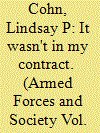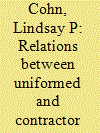| Srl | Item |
| 1 |
ID:
106434


|
|
|
|
|
| Publication |
2011.
|
| Summary/Abstract |
An increase in the use of private military and security contractors over the last two decades has sparked a debate over whether their employment enhances or detracts from government control of its security agents. Although there is a rich literature on civilian control of military agents, there is still disagreement on the operationalization of control, and there has been little attempt to apply these theories to private actors. This article contributes to both discussions by offering a synthesis of theories of control and comparing features specific to public versus private agents that may affect control. The author offers the hypothesis that the principles of democratic governance are likely to be more secure when policy is carried out by public agents.
|
|
|
|
|
|
|
|
|
|
|
|
|
|
|
|
| 2 |
ID:
153623


|
|
|
|
|
| Summary/Abstract |
Economic studies of military manpower systems emphasize the advantages of voluntarism under all but the most total threats, but this explains neither the persistence of institutionalized conscription in many states nor the timing of shifts from such conscription systems to volunteer militaries. Traditional explanations focus on external threat levels, but this has also proven unsatisfying. We theorize that threat variables establish the state’s baseline need for manpower, but structural economic variables determine whether the necessary manpower can be more efficiently obtained by conscription or voluntarism. Using a new data set of 99 countries over 40 years, we find that states with British origins are less likely and those experiencing greater external threat are more likely to employ conscripts. Most importantly, states with more highly regulated labor markets are more likely to employ conscripts, which suggests that, controlling for a number of relevant factors, labor markets matter in military manpower decisions.
|
|
|
|
|
|
|
|
|
|
|
|
|
|
|
|
| 3 |
ID:
120310


|
|
|
|
|
| Publication |
2013.
|
| Summary/Abstract |
Contemporary operations require the US military to work with enormous numbers of private contractors. The official reasoning for this is that private contractors are more cost-effective than military personnel, as contractors can be hired and paid for specific jobs, while military personnel must be maintained year-round at a high cost. On the other hand, many service-members bring back stories of contractor failure or misconduct. Is it in fact more efficient to use contractors on a battlefield? How can multi-agency operations be made most effective? This article attempts to contribute to these questions by determining the conditions under which contractors will 'work' for the military. Theory indicates that they will do so if the likelihood of being caught and punished for shirking is high. I examine the relations between military personnel deployed in Iraq and the contractors accompanying them through a questionnaire and targeted interviews.
|
|
|
|
|
|
|
|
|
|
|
|
|
|
|
|